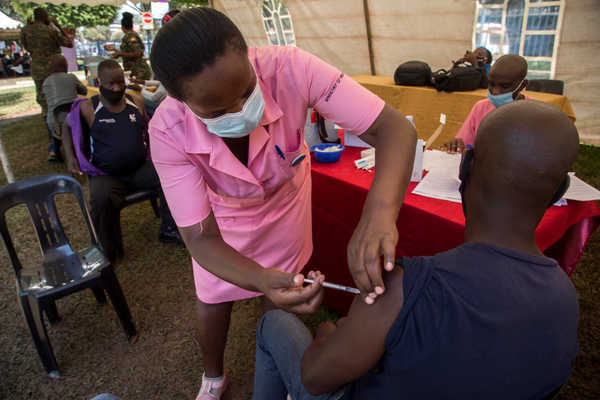Prime
How soon should you get your jab?

If there is any doubt about when to take the vaccine, seek medical advice from a health worker.
What you need to know:
There has been debate and worry about when someone who has suffered from Covid-19 should get vaccinated. According to experts, the time varies but the most important factor is getting tested first.
According to statistics from the Ministry of Health (MoH), five million people have been vaccinated against Covid-19 while the number of vaccination doses administered per 100 rose to eight as of November 13, 2021.
The MoH is doing a regional mass vaccination campaign in order to increase its uptake on top of extending vaccination campaigns to schools, hospitals, theatres and bars.
With more places being opened up as vaccination centres, the response to taking the vaccines is slightly improving but some people are not sure of when they should be getting the jab.
Fred Zziwa suffered a severe infection of the coronavirus in September that saw him hospitalised for over a month. When he was out of danger, he was discharged and remained isolated at his home for two weeks. A week later, he was feeling better but he did not test to find out if he had completely healed.
However, he still had difficulty breathing and an on and off cough. When he inquired from his doctor what was happening, he was told that his lungs had been damaged by the virus and more time was needed for complete healing.
“When I learnt that there was a chance to get vaccinated, I went for the first dose of AstraZeneca about a week ago but I still suffer from the cough and difficulty breathing. I thought the vaccine would hasten the healing process but it did not. I doubt I will go for the second jab,” Zziwa remarks.
Testing
Zziwa is one of the many people who impulsively go for vaccination without first testing to know their status. According to Dr Charity Asaba, a medical officer, one should undergo a Covid-19 test before getting vaccinated.
“Not taking a Covid-19 test before vaccination is the reason some people get severe side effects,” she says.
The vaccine cannot give you Covid-19 according to the Centre for Disease Control and recommends delaying vaccination to after 90 days of infection if you have never been vaccinated.
You need the vaccine
Although there have been rumours that the body builds natural immunity against Covid-19 once you have suffered from it, Dr Sabrina Kitaka, a paediatrician, urges everyone to get vaccinated regardless of whether they have had symptomatic or asymptomatic infection of the virus.
“Even if you have suffered from Covid-19, it is important to get vaccinated to revamp your immune system. Since, research focusing on how long immunity lasts after having Covid-19 is not clear, it is always safer to be protected by the vaccine,” she says.
If you get infected by Covid-19 after getting your first jab, Dr Kitaka recommends waiting 21days before getting the second shot. Those who suffer aftereffects should also be vaccinated.
“If the infection was severe, then you have to wait 90 days. Failure to complete the dose will place one at risk of suffering from severe disease,” she emphasises.
Re-infection
The risk of Covid-19 re-infection is low in the months after initial infection but may increase with time due to waning immunity. Experts also recognise the risk of re-infection and, therefore, urge that the benefit of vaccination increases with time following initial infection.
“People who have suffered from the virus should wait until they have recovered and have tested negative to avoid interference of the antibody therapy with vaccine-induced immune response making it difficult to distinguish vaccine side effects from mild Covid-19 symptoms,” Dr Asaba says.
Choosing to take your jab while you are still sick exposes everyone around you to the virus and there is no evidence that it will help with quick recovery. Also, it is important to note that the vaccine does not give full protection but rather reduces severity and the risk of death in case you get the virus.
Special groups
According to Dr Ndozire Jnr, a gynaecologist, the vaccines that are available are safe for pregnant women in all trimesters.
He adds that a woman can take the jab any time but; “we prefer that she takes the jab in the second trimester onwards (12 weeks of gestation) because the development process happening in the first trimester might not need interruption. We tend to limit medicines in the first trimester.”
Initially, the most vulnerable group that needed the vaccination first were the elderly above the age of 50. The Ministry of Health then announced that the vaccines are available to all adults above the age of 18. The Centre for Disease Control recently approved the use of Pfizer vaccine for children who are 12 years and above.




